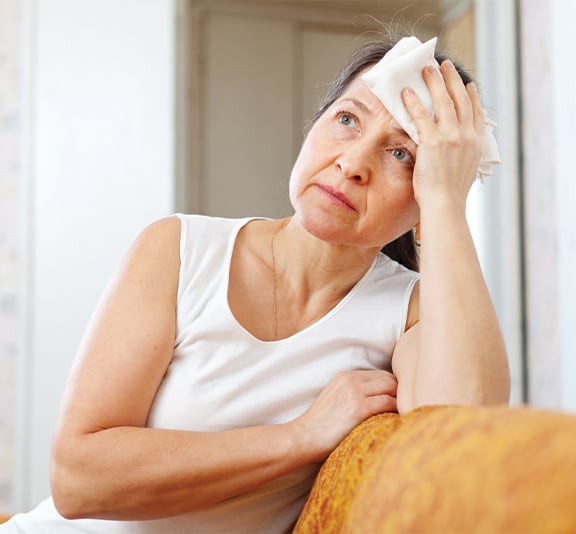.jpg)
.jpg)
We bring together a dedicated team of highly skilled professionals, to help you manage the overwhelming symptoms and challenges associated with menopause. We strive to offer compassionate care backed by the latest approaches, personalized treatments and state-of-the-art modalities because we believe that you deserve the best, especially when it comes to your health.

Menopause is a biological process that is said to happen exactly 12 months after a woman's menstrual cycle comes to an end. It happens when the ovaries stop generating eggs and the production of oestrogen and progesterone declines.
Every woman has to undergo menopause as it is a natural process, however, it can give rise to a number of unpleasant symptoms as well as put you at an increased risk of certain health concerns.
Menopause is most common among women who are in their late 40s or early 50s, but it can happen at any age.
Menopause is primarily a natural process that is most likely to affect middle-aged women, however, in some cases, it can be experienced by younger women owing to different factors.
Based on these, menopause can be classified into the following
Menopause is not abrupt, but rather gradual and it progresses through 3 different stages. These are:
Symptoms of menopause can be potentially debilitating and it is advisable to seek proper medical intervention if you are finding it difficult to cope with any of these.
Some of the most common symptoms include:
Menopause is a normal part of ageing, caused by a change in the levels of reproductive hormones in the body over the years. The gradual decrease in the production of estrogen and progesterone leads to perimenopause and eventually, you stop ovulating.
It is pertinent to understand that the length of time between perimenopause and menopause is not the same for every woman and can be as long as 10 years.
There are several factors that can lead to early menopause. These include:
There is a direct and close-knit link between menopause and reproductive hormones, estrogen and progesterone. In fact the majority of the symptoms experienced before and during menopause are linked to the slow drop in these hormones in the years leading up to menopause. < /p>
If you lie in the typical age group during which menopause is experienced, it is not hard to make the diagnosis. However, if someone has experienced these symptoms way before, our experts recommend a proper diagnosis to rule out other possible conditions and determine the underlying cause of early menopause.
You may be asked to undergo blood analysis to assess the levels of the following hormones:
While menopause cannot be avoided, the symptoms can be managed using a variety of approaches, tailored to address your specific problems.
Various health complications associated with Menopause include:
It is quite possible as the hormonal changes caused by Menopause can lead to accelerated muscle loss and unhealthy weight gain.
Although not always, several factors associated with Menopause can cause depression in some cases. This is due to the significant changes in your hormones.
A Hysterectomy procedure can lead to abrupt Menopause only if the Ovaries have been removed. Even after the uterus is taken out, the Ovaries continue to produce Estrogen and Menopause happens naturally.
Although Menopause won’t stop you from having an orgasm, it can make it a little harder to achieve it. This is predominantly due to the hormonal changes that our body undergoes during the process.
It is good to be curious when it comes to your health, but, it is equally important to put your curiosity to rest by seeking expert opinion. Have more questions related to your health?
Meet the compassionate souls behind our services. Our dedicated team of professionals is here to ensure you receive the best care, always

Meet the compassionate souls behind our services. Our dedicated team of professionals is here to ensure you receive the best care, always
Our commitment to world-class care is reflected in our numerous certifications, awards, and partnerships. Trust in our proven track record of excellence.
